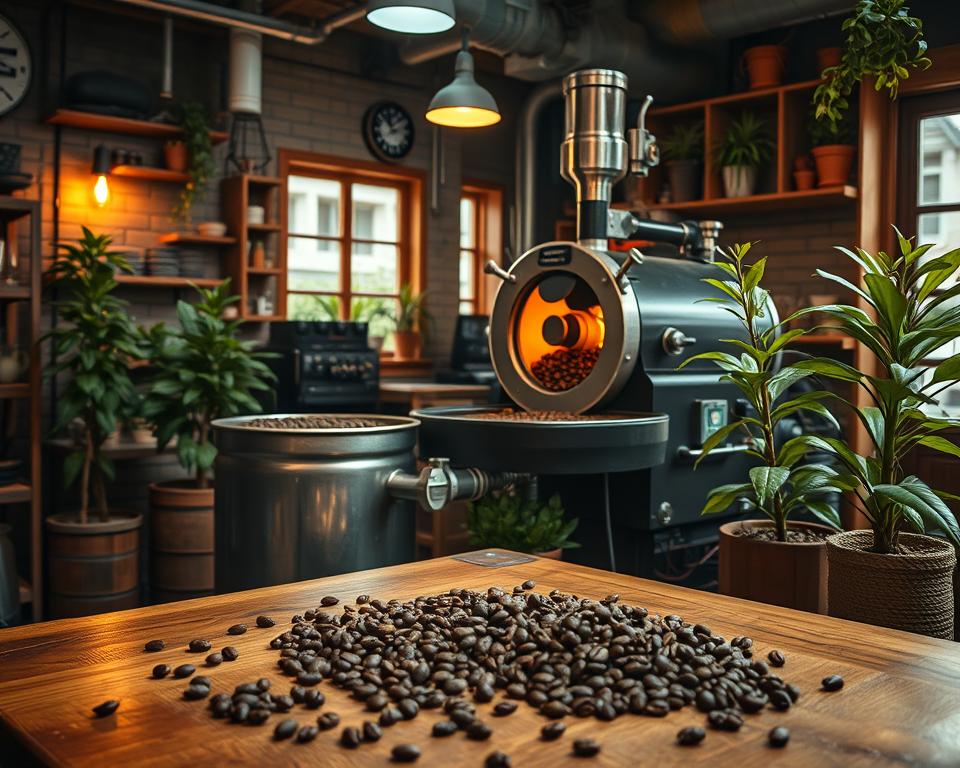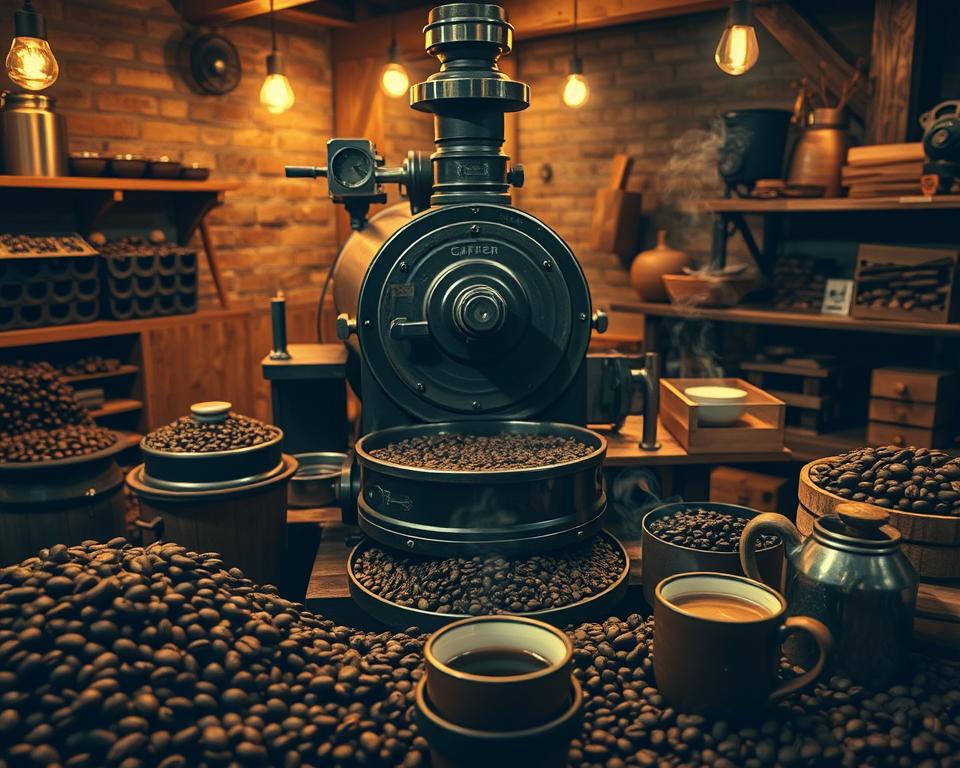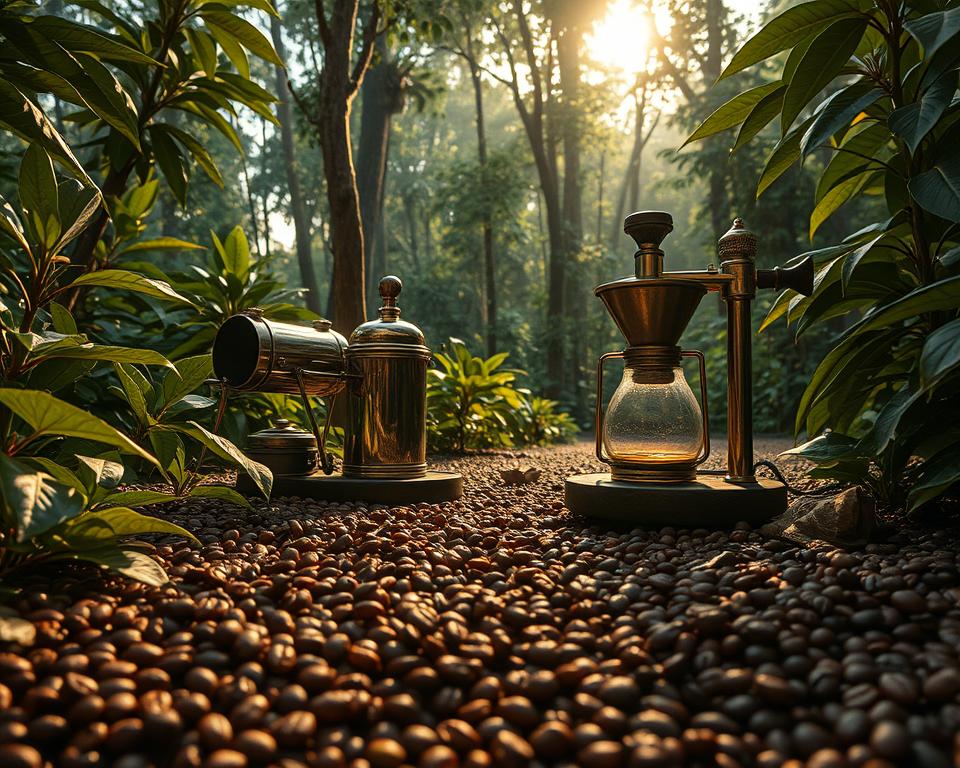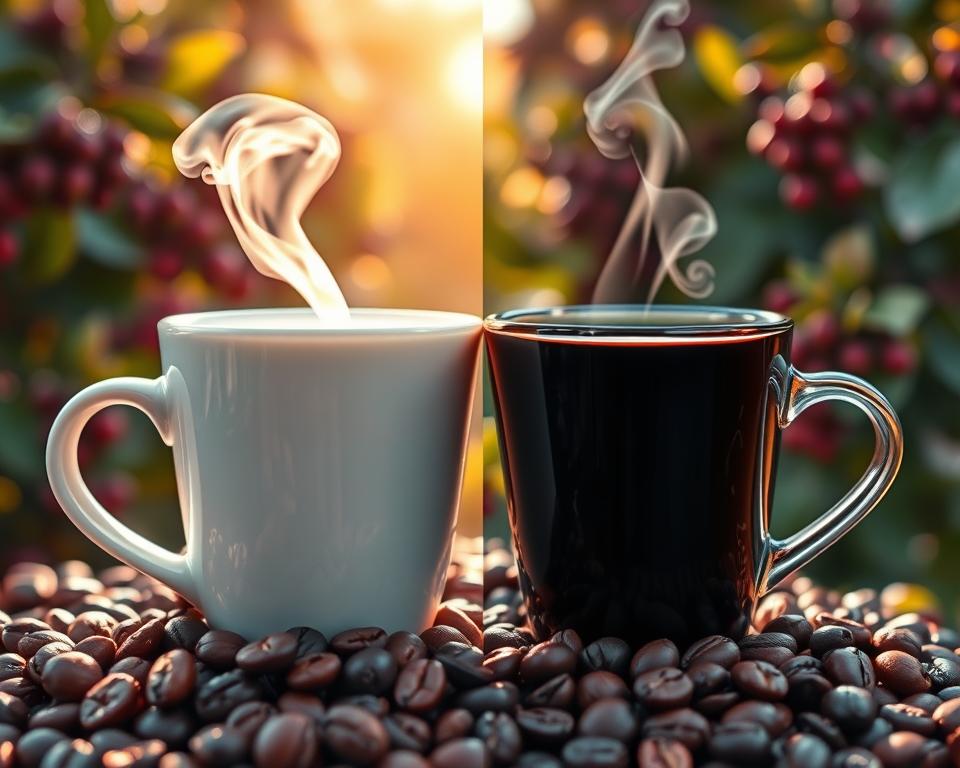Small batch coffee roasting focuses on quality, flavor, and a unique coffee experience. Roasters can control the process closely by roasting less than 50 pounds at a time. Such detail leads to a consistent, flavor-rich roast that coffee lovers adore.
The art of small batch roasting creates an immersive coffee journey. It aims for perfection with every batch made. Today, as more people look for artisanal coffee, they’re drawn to its superior taste, ethical sourcing, and exquisite craftsmanship. This kind of production appeals to those who care deeply about their coffee’s story and quality.
Small batch roasters build strong relationships with coffee farmers. They ensure direct trade deals that benefit everyone, from the farm to your cup. This approach not only promotes sustainability but also leads to unique, exquisite blends for fine coffee lovers.
The Art and Science of Small Batch Coffee Roasting
Small batch coffee roasting combines art with science. It requires knowledge of roasting and understanding coffee bean traits. This method uses up to 50 pounds of beans, allowing roasters to adjust each batch carefully. This meticulous process contributes to the uniqueness and benefits of small batch roasting.
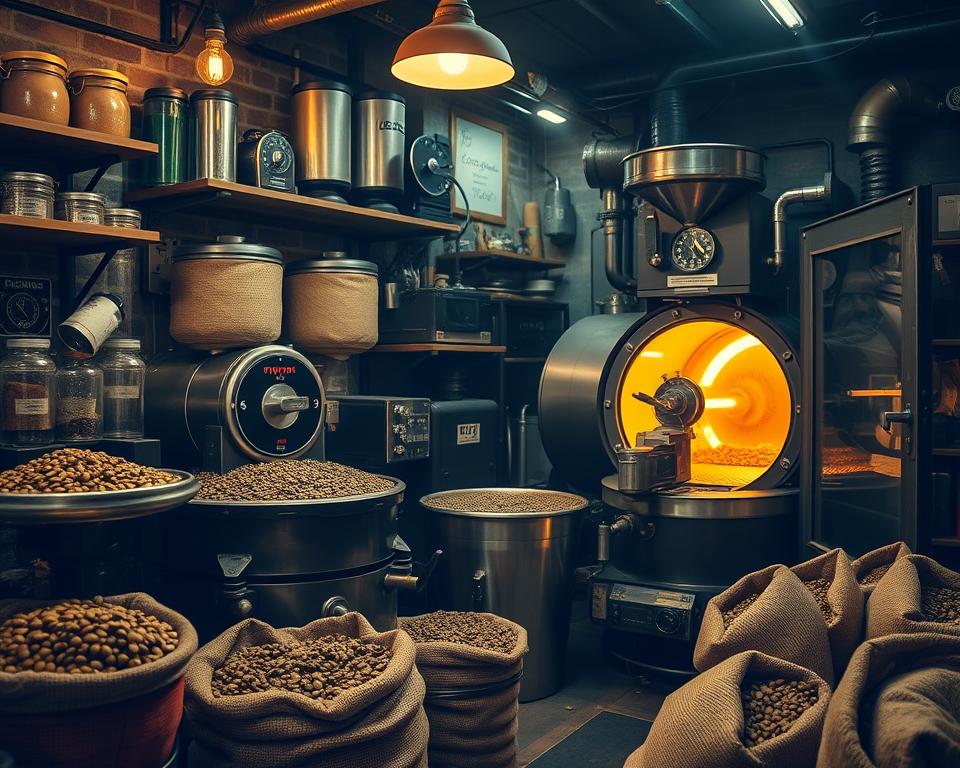
What is Small Batch Coffee Roasting?
Small batch roasting means roasting coffee in amounts from 1 to 45 pounds. It’s valued for the roaster’s skill in closely watching and adjusting heat and time. Small batches let each coffee bean show its unique flavors.
Roasters use specific equipment for small batches, like drum or air roasters. These tools help roasters refine their roasting methods for unique coffee experiences. Combining art and science this way leads to better coffee.
The Benefits of Small Batch Roasting
Small batch roasting means precise control, leading to consistent, high-quality coffee. This close attention to the roasting process offers the freshest coffee, improving taste.
It also sparks creativity. Roasters test different beans and blends, offering unique coffee choices. This approach is eco-friendly and supports local farmers, enhancing both quality and community.
Differences Between Small Batch and Large Batch Roasting
Small batch roasting focuses on detail and customization, unlike large batch roasting. Large scale roasting sacrifices control and freshness due to its volume. These methods lack the personal care found in small batch roasting.
Large roasters store beans, which may lose flavor. Small batch roasters roast to order, keeping the coffee fresh and tasty. This preserves quality, making it stand out from bulk coffee.
The commitment to small batch roasting shows a commitment to quality and the pursuit of the best coffee. This mix of traditional and innovative practices is why coffee lovers respect small batch roasting.
Importance of Sourcing High-Quality Beans
High-quality beans are crucial for small batch coffee roasting. They affect everything from the coffee’s flavor to its global impact. Specialty coffee roasters pick the best beans for an exceptional coffee experience.
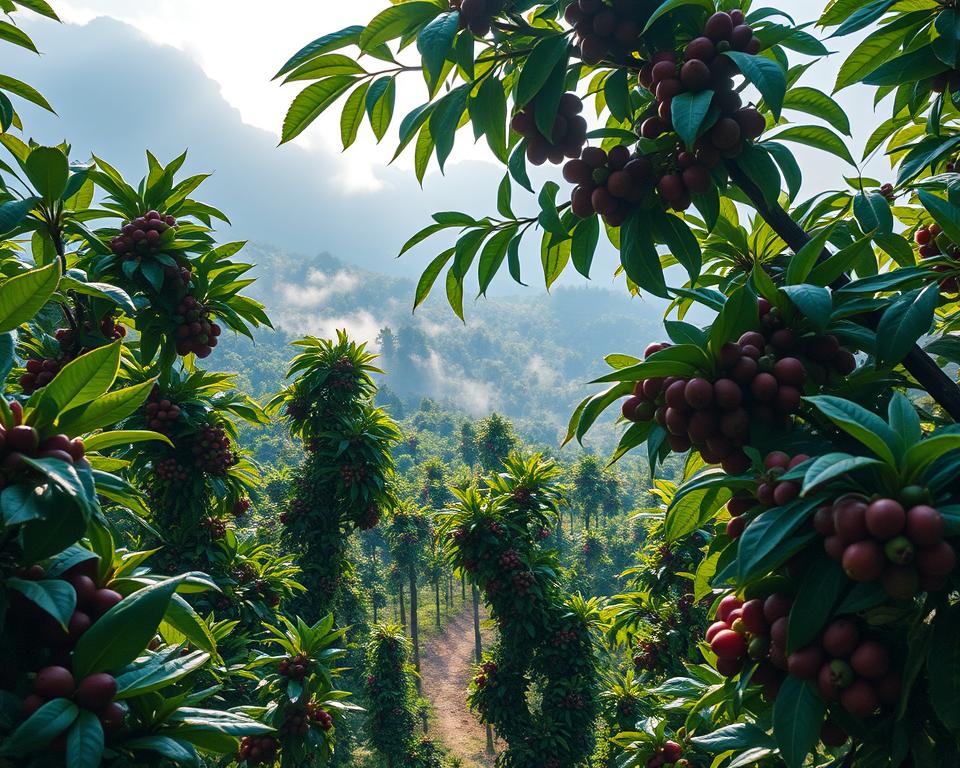
Flavor Impact
Superior beans give rich and complex flavors. This creates unique small batch coffee blends. The careful roasting process showcases each bean’s flavors. It leads to specialty blends that please many tastes, making coffee drinking better.
Sustainability and Ethical Sourcing
Fair trade coffee agreements are key in sustainable coffee. They support smaller producers and ensure fair partnerships. This helps the farmers’ communities and the environment, showing a commitment to sustainable coffee.
Unique and Distinctive Blends
Quality sourcing leads to unique and distinctive blends. These specialty blends stand out, offering a memorable taste journey. The small batch process lets roasters try different beans and techniques. This creates unique blends that show the true art of coffee roasting.
Small Batch Coffee in the Industry
Small batch coffee roasting is changing the industry. It focuses on personal, high-quality coffee experiences. This trend gives roasters more control and lets them innovate. People are noticing how special these artisan roasters are.
The rise of specialty coffee is changing what people expect. They want fresh, unique, and eco-friendly coffee. Small batch roasting helps farmers get fair prices. This improves their lives and encourages earth-friendly farming.
Small batch roasters prefer organic farming. It lessens the environmental harm of coffee growing. They can try out different roasts and flavors. This makes each cup of coffee unique.
Small batch roasting also reduces carbon emissions. Roasters buy beans from local or close regions. This cuts down on transport pollution. It supports local communities and makes the coffee industry greener.
Roasters test many samples to find the best roast. The Aillio Bullet Roaster R1 V2 is great for small shops. It lets roasters control the process for better coffee.
Small batch roasting means great coffee every time. Roasters focus on the coffee beans’ quality. Their ethical and quality focus enriches the coffee culture. It shows how important small batch roasting is in the coffee market.
The Impact on Coffee Flavor and Quality
Small batch coffee roasting deeply affects how coffee tastes. It makes sure every bean is perfect. A careful roasting process helps keep the beans’ unique flavors and aromas. This care makes the coffee special and a treat for drinkers.
Roasters watch time and temperature closely during roasting. These influence the coffee’s acidity, body, and flavor. They use roast profiles to shape these tastes, offering a unique coffee. Temperature graphs show how heat changes affect flavor.
Consistent Roasting Process
Being consistent is crucial with small batch roasting. It ensures every bean is roasted evenly. Small batch roasters control things perfectly, unlike large batches. This means the coffee tastes the same every time, bringing out each cup’s special qualities.
Different roast levels create different tastes. Light roasts make coffee acidic but highlight floral and fruity notes. Medium roasts blend bean flavors with sweet notes, like chocolate. Dark roasts have a rich flavor but less acidity.
Preservation of Unique Flavors and Aromas
Keeping coffee beans’ special traits is vital for great coffee. Small batch roasters are great at keeping aromas, making sure each bean shines. This careful work leads to coffee with lively notes and a rich finish, showing off the beans’ quality.
Small batch roasting involves precise control over things like sugar caramelization. This keeps the coffee’s subtle flavors and smells, giving a top-notch coffee experience. From light to medium roasts, each sip shares the roaster’s passion and skill.
How Do Best Practices in Organic Coffee Roasting Influence Small Batch Coffee Quality?
Best practices for coffee roasting are essential for ensuring the highest quality in small batch coffee. These practices focus on precision in temperature control and roasting time, allowing for the unique flavor profiles of each bean to shine. By adhering to these guidelines, roasters can consistently produce exceptional coffee experiences.
Conclusion
Looking back at small batch coffee roasting shows its key role in the coffee world. This method roasts less than 50 pounds of beans at once. This allows roasters to precisely control the roast, making each batch unique and tasty.
It also honors both old and new roasting methods. This careful attention from bean to roast connects with the craft coffee community.
Small batch isn’t just about how it’s done; it celebrates the journey of coffee. Each batch shares a story of where and how beans were grown. The use of high-quality, ethically sourced beans boosts the coffee’s taste. This commitment highlights the importance of sustainable practices in coffee making.
As consumers want more from their coffee, small batch roasting becomes more appealing. It draws those who appreciate the art of coffee making. They enjoy exploring unique flavors and blends. Small batch roasting creates a special connection for coffee lovers. It brings them closer to their brew.
FAQ
What is Small Batch Coffee Roasting?
Small batch coffee roasting is when coffee is roasted in smaller amounts, less than 50 pounds. This method gives roasters control over the roast, leading to unique flavors.
What are the Benefits of Small Batch Roasting?
Benefits include more consistent coffee, personalized tastes, and promoting creativity. It highlights quality and the unique aspects of coffee.
How Does Small Batch Roasting Differ from Large Batch Roasting?
Small batch focuses on small amounts for precise flavor control. On the other hand, large batch deals with more beans, which may lessen control and detail.
How Does the Sourcing of High-Quality Beans Impact Flavor?
High-quality beans lead to complex and unique flavors in coffee. These beans, along with careful roasting, make a premium coffee experience with rich flavors.
Why is Sustainability and Ethical Sourcing Important in Small Batch Coffee?
Ethical practices support sustainable farming and improve farmers’ lives. They lead to a healthier environment and support for the coffee communities.
How Do Small Batch Roasters Create Unique and Distinctive Blends?
Roasters collaborate with farmers to select the best beans. Their precise roasting techniques produce a variety of taste profiles, making their coffee stand out.
What Trends are Emerging in the Coffee Industry Due to Small Batch Roasting?
Small batch roasting is sparking interest in unique, quality coffee. This trend encourages freshness, innovation, and supports local businesses and new production methods.
How Does the Roasting Process Impact Coffee Flavor and Quality?
The roasting process is key for flavor and quality. Consistent roasting makes sure each bean is perfect, preserving its unique characteristics for a premium taste.
Why is the Preservation of Unique Flavors and Aromas Important?
Keeping the beans’ special flavors and smells is key for a great coffee. Careful roasting ensures these qualities are kept, showing the roasters’ skill and commitment.

